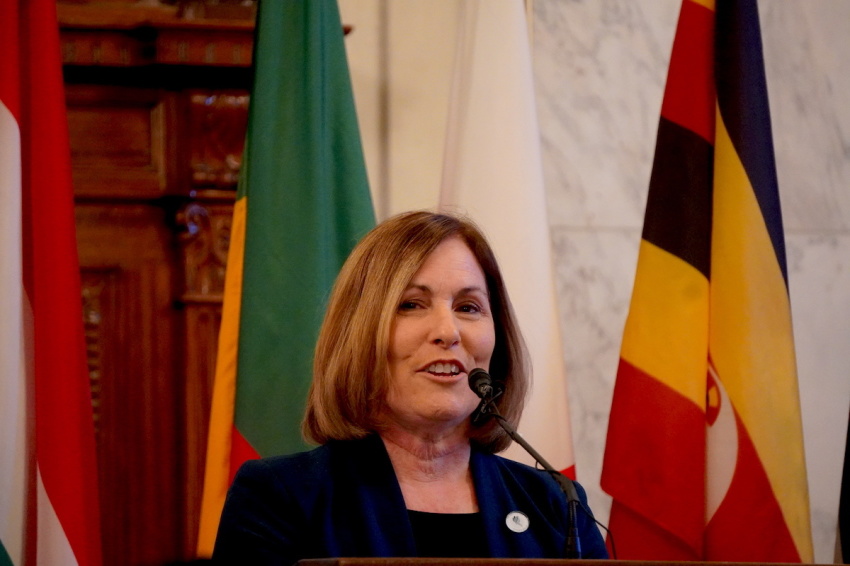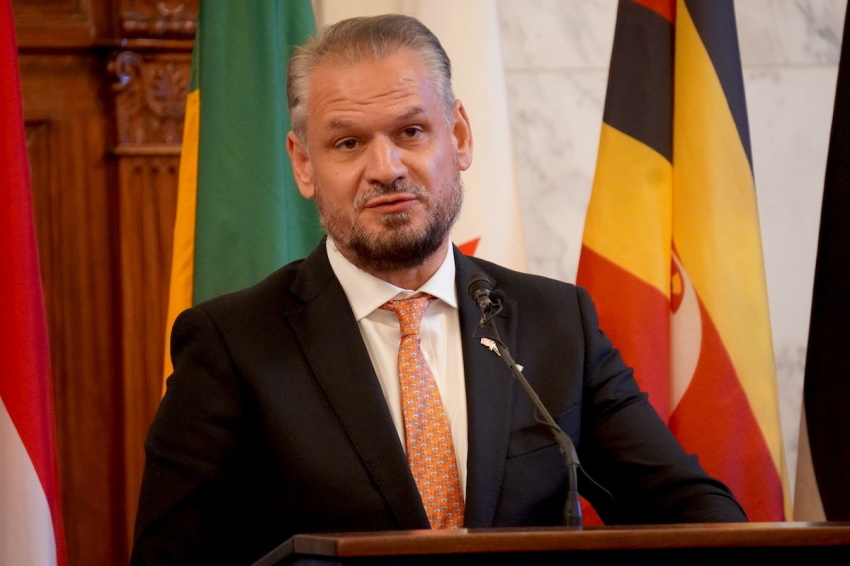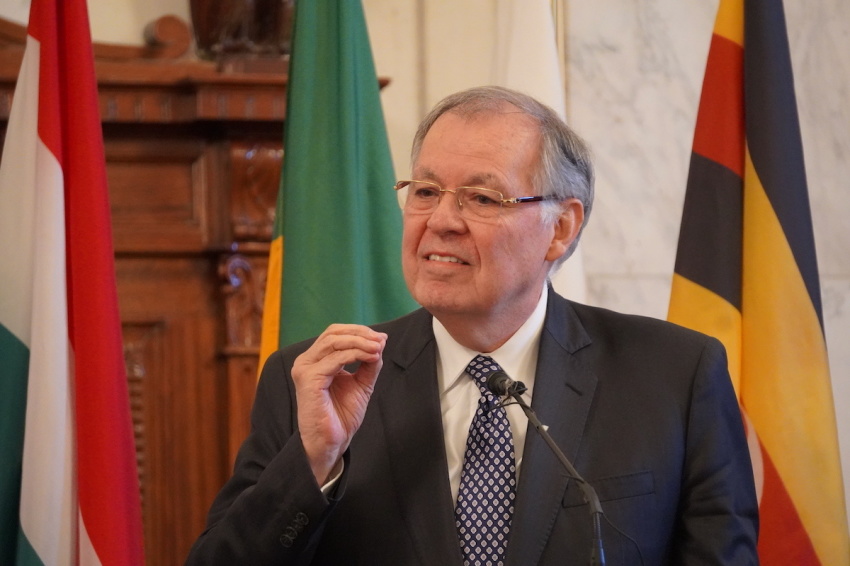37 countries sign pledge to uphold pro-life, pro-family policies 2 years after Geneva Consensus Declaration

WASHINGTON — The number of countries expressing support for a document explicitly stating that “there is no international right to abortion” continues to expand as nations around the world work to implement policies consistent with its mandate to make the family the bedrock of society.
Lawmakers, pro-life activists and representatives of governments worldwide gathered on Capitol Hill Thursday to commemorate the second anniversary of the signing of the Geneva Consensus Declaration on Promoting Women’s Health and Strengthening the Family, which declares that “there is no international right to abortion.” The United States was one of the nearly three dozen countries that first signed the document on Oct. 22, 2020, although it later withdrew support after President Joe Biden took office.
Signatories to the Geneva Consensus Declaration include: Bahrain, Belarus, Benin, Brazil, Burkina Faso, Cameroon, DRC, Congo, Djibouti, Egypt, Eswatini, Gambia, Georgia, Guatemala, Haiti, Hungary, Indonesia, Iraq, Kenya, Kuwait, Libya, Nauru, Niger, Oman, Pakistan, Paraguay, Poland, Qatar, Russian Federation, Saudi Arabia, Senegal, South Sudan, Sudan, Uganda, UAE, Zambia.
The document’s name reflects that it was crafted at the 2020 World Health Assembly, which was slated to take place in Geneva, Switzerland, until the coronavirus pandemic forced the event to be held virtually.
The Institute for Women’s Health hosted a ceremony in the Russell Senate Office Building featuring remarks from U.S. lawmakers and diplomats from nations that have signed the Geneva Consensus Declaration discussing the efforts made by their countries to improve health outcomes for women and girls while rejecting the idea that abortion constitutes a form of women’s healthcare. The Institute for Women’s Health is a nonprofit organization that works to “advocate for the optimal health and thriving of women throughout every phase of life.”
At the event, IWH President Valerie Huber spoke in front of flags representing each of the countries that have signed the agreement. One of the flagpoles lined up behind Huber did not have a flag attached to it and Huber indicated that “that could be your country next year,” adding, “We’ve just learned this morning that another country has already taken that particular flagpole.” She announced that Kazakhstan had become the 37th nation to sign onto the Geneva Consensus Declaration.
The Eastern European nation of Kazakhstan has come under fire for its treatment of religious minorities. Earlier this year, the U.S. Commission on International Religious Freedom recommended that the U.S. State Department place Kazakhstan on a special watch list for countries that engage in “systematic, ongoing, and egregious violations” of religious freedom.
As she introduced Kazakhstan as the newest signatory to the Geneva Consensus Declaration, Huber stressed that “countries and coalitions sometimes disagree on policies outside of those coalitions.”
Huber added, “The Geneva Consensus Declaration intentionally creates alliances with both traditional and non-traditional allies in order to strengthen mutually agreed upon norms within the GCD.”
Additionally, Huber presented the nation of Brazil and President Jair Bolsonaro with the Distinguished Award of International Honor for “defending life, family, women’s health and national sovereignty as a global leader of the Geneva Consensus Declaration.” Huber noted that “Brazil has served as the Secretariat of the Geneva Consensus Declaration for the past two years,” assuming the role of welcoming new signatories to the coalition.
The Institute for Women’s Health will formally present Brazil and Bolsonaro with the award next month, with Huber explaining that “it’s already in Brazilia.” Huber also informed attendees that Brazil was passing the role of Secretariat to Hungary.
Huber said the proclamation that “there is no international right to abortion” is one of the four pillars of the Geneva Consensus Declaration. The other pillars seek the improvement of “the health of women and girls” around the world, “affirm the family as foundational to every healthy society” and “defend the sovereign right of every nation to protect those values.”
The document explicitly asserts that “the family is the natural and fundamental group unit of society and is entitled to protection by society and the State.” It also highlights the entitlement of motherhood and childhood are entitled to “special care and assistance,” maintains that “women play a critical role in the family” and offer a unique “contribution to the welfare of the family and to the development of society.”
One of the other speakers at the event, Ambassador Szabolcs Takacs of Hungary, outlined some of the policies his country has enacted in order to support and strengthen families. “We invest 6 percent of our GDP to support families,” he said. Takacs added that mothers with at least four children have full exemptions from paying personal income tax for their entire lives. Hungarians younger than 25 do not have to pay personal income tax either.

Suggesting that the results of Hungarian government policy “speak for themselves,” Takacs reported that “Since 2012, the number of marriages in Hungary has doubled.” Takacs was not the only foreign diplomat to tout his country’s efforts to advance the pillars of the Geneva Consensus Declaration.
Ambassador Alfonso Quinonez of Guatemala discussed the Latin American nation’s Public Policy for the Protection of Life and the Institutionality of the Family, which seeks to assist “the needs of all Guatemalans and to improve the condition of women and girls, highlighting the importance of the participation and significant contribution to all areas of society.” He expressed gratitude that the Ibero-American Congress for Life and Family had previously declared Guatemala as the pro-life capital of Latin America.

The Geneva Consensus Declaration is a response to efforts by supranational organizations to create an international human right to abortion. In 2019, the United Nations published a document calling for the establishment of “universal access to sexual and reproductive health and rights” by 2030.
The U.N.’s 2019 declaration on universal health coverage did not directly use the word “abortion” but instead used the term “sexual and reproductive health,” often used as a euphemism for abortion. The Geneva Consensus Declaration regards abortion and “sexual and reproductive health” as two entirely different concepts.
Earlier this year, the World Health Organization called for the decriminalization of abortion worldwide, describing the termination of a pregnancy as “lifesaving care” and “a crucial part of health care.”
Huber lamented the phenomenon where “nations, international organizations, foundations, special interest groups and multinational businesses apply pressure to countries to adopt policies that are contrary to their fundamental values surrounding life and family at the expense of those they say they want to help.”
Ryan Foley is a reporter for The Christian Post. He can be reached at: ryan.foley@christianpost.com



























